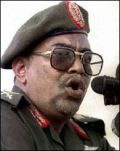Sudanese president say improvements in Darfur disappoint Khartoum’s enemies
By MOHAMED OSMAN, Associated Press Writer
 KHARTOUM, Sudan, Sep 10, 2004 (AP) — Sudanese President Omar el-Bashir slammed critics of his government’s efforts to address the Darfur crisis, saying Friday that improvements in the situation in the strife-torn region have disappointed his country’s enemies.
KHARTOUM, Sudan, Sep 10, 2004 (AP) — Sudanese President Omar el-Bashir slammed critics of his government’s efforts to address the Darfur crisis, saying Friday that improvements in the situation in the strife-torn region have disappointed his country’s enemies.
In his first comments since U.S. Secretary of State announced Thursday that the crisis in Darfur amounted to genocide, el-Bashir said the situation in his country’s three Darfur states, scenes of a 19-month conflict, “is moving toward constant improvement.”
“Life has been normalized in most of the areas affected by the war, in particular in Western Darfur, and in other areas in Southern and Northern Darfur,” el-Bashir said in comments broadcast on state-run TV.
The United States and aid groups accuse el-Bashir’s government of backing Arab militiamen, known as the Janjaweed, in attacks against African villagers in Darfur that have killed an estimated 30,000 people and driven more than 1 million more from their homes.
El-Bashir did not refer directly to Powell’s description that the government-backed Janjaweed had committed acts of genocide against Darfur villagers, but Sudanese officials have rejected the U.S. secretary of state’s remarks.
“We can say the situation in Darfur is very reassuring, contrary to what the others are saying at present about what is going on in Darfur,” el-Bashir said, stressing that ongoing efforts to achieve peace and stability in Darfur will succeed.
“We believe that the positive, huge and successive developments that have taken place in Darfur have surprised the enemies of Sudan,” he added. “That is why they tried to impede these efforts which, God willing, shall lead to the realization of peace, security and stability in Darfur at the end.”
Powell’s genocide designation came as a U.S. proposal in the U.N. Security Council to impose sanctions against Sudan encountered opposition. Washington has been pressuring the U.N. Security Council to impose sanctions on Sudan’s oil industry, among other measures, if the government does not take steps to improve security in Darfur.
Such sanctions are opposed by China and Pakistan, Security Council members that import Sudanese oil.
In Abuja, Nigeria, where Darfur peace talks are under way, Sudanese Deputy Foreign Minister Najeeb El-Khair Abdel Wahab criticized Powell’s action.
“We don’t think this kind of attitude can help the situation in Darfur. We expect the international community to assist the process that is taking place in Abuja, and not put oil on the fire,” he said.
The European Union also was critical. “We have not discussed specifically the use of the word genocide,” said spokesman Jean-Charles Ellermann-Kingombe. “For us, we have noted that there is an extremely serious situation that still requires a huge humanitarian aid effort.”
The EU has, however, joined the United States in using the threat of sanctions against Sudan to do more to rein in the Janjaweed and restore security and stability to Darfur.
Powell said that as a member of the 1948 international genocide convention, Sudan is obliged to prevent and punish acts of genocide.
In recent interviews with 1,136 refugees in neighboring Chad, the State Department found a “consistent and widespread pattern of atrocities committed against non-Arab villagers,” according to a department report. It added that about a third of the refugees who were interviewed heard racial epithets while under attack.
The violence in Darfur began when black African tribes rebelled in February 2003, accusing the national government in Khartoum of neglecting their interests. In response, Powell said, Arab militias coupled with Sudanese military forces “committed large-scale acts of violence, including murders, rape and physical assaults on non-Arab individuals.”
